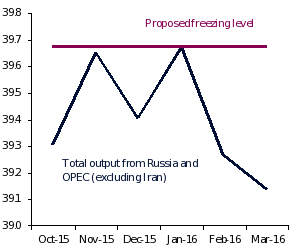Some of the world’s major oil producers met in Doha on April 17 to discuss possible steps to support the oil market. Market participants had expected a deal involving a stabilisation of production at January levels, perhaps until October.The deal was expected to exempt Iran, which had just returned to international markets following the lifting of sanctions in January. But the meeting ended without a deal as producers said they needed more time to reach agreement. In our view, a production freeze that excludes Iran would not materially alter the outlook for oil supply. Therefore, the failure to reach an agreement in Doha, does not significantly change the fundamentals of the market. The oil market is rebalancing thanks to supply cuts among high-cost US shale producers and robust demand growth.
The proposal to impose an oil production freeze that excludes Iran would not have changed the oil market dynamics for three reasons. First, Iran is the main growth country for oil production. It has already added 370k barrels per day (b/d) since January and we expect its production to continue rising, eventually adding a total of 600k b/d by June. Meanwhile, Goldman Sachs expects the rest of OPEC plus Russia to collectively add only 243k b/d on average in 2016. Unless Iran joins in the freeze agreement, the outlook for oil supply is unlikely to change materially.
Second, the production freeze was proposed at January levels, when output among the producers involved was already at historic highs. Since then, total production by Russia and OPEC (excluding Iran) has fallen by nearly 500k b/d. Therefore, a freeze at January levels still leaves these countries significant scope to raise output.
Below freezing point
(m b/d)

Sources: Joint Organisations Data Initiative, OPEC, Haver Analytics and QNB Economics estimates
Third, a production freeze would give a lifeline to US shale producers if it resulted in a strong rebound in oil prices. Low prices are driving US shale producers out of the market by making their business un-viable. Since its peak in April 2015, crude oil production in the US has fallen by nearly 500k b/d. A strong rebound in prices would enable some shale companies to return to profitability, delaying and potentially derailing the rebalancing in the market.
As the proposed production freeze was largely irrelevant for oil markets,the failure to reach agreement in Doha also has had little impact on the outlook. Indeed, markets shrugged off the lack of an agreement fairly quickly with oil prices closing unchanged on the following trading day. This might have been partly due to strikes in Kuwait, which are disrupting oil production. But there is also a growing conviction in financial markets that a rebalancing is underway, providing support to oil prices.
The adjustment of oil markets to lower prices is gathering pace. It is not just restricted to the supply side in the US, but also visible on the demand side, which is proving robust despite all the uncertainty around the outlook of the global economy. As a result, we expect oil prices to continue their gradual recovery, with an average price of USD41 per barrel in 2016.
